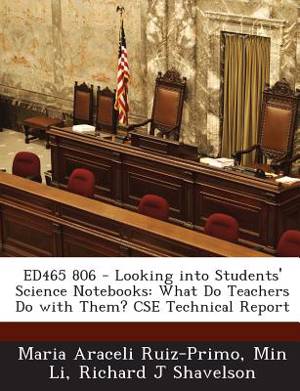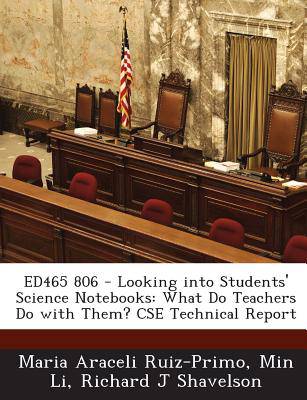
En raison d'une grêve chez bpost, votre commande pourrait être retardée. Vous avez besoin d’un livre rapidement ? Nos magasins vous accueillent à bras ouverts !
- Retrait gratuit dans votre magasin Club
- 7.000.000 titres dans notre catalogue
- Payer en toute sécurité
- Toujours un magasin près de chez vous
En raison de la grêve chez bpost, votre commande pourrait être retardée. Vous avez besoin d’un livre rapidement ? Nos magasins vous accueillent à bras ouverts !
- Retrait gratuit dans votre magasin Club
- 7.000.0000 titres dans notre catalogue
- Payer en toute sécurité
- Toujours un magasin près de chez vous
Ed465 806 - Looking Into Students' Science Notebooks
What Do Teachers Do with Them? CSE Technical Report
Maria Araceli Ruiz-Primo, Min M D Li, Richard J Shavelson
Livre broché | Anglais
21,95 €
+ 43 points
Description
This paper proposes the use of students science notebooks as one possible unobtrusive method for examining some aspects of teaching quality. Students science notebooks were used to examine the nature of instructional activities in their science classrooms, the nature of teachers' feedback, and how these two aspects of teaching were correlated with student achievement. Researchers examined the characteristics of science notebooks for 6 students from each of 10 fifth-grade classrooms. Each entry was analyzed. Results indicate that raters can consistently classify students notebooks in spite of the diversity of the forms of communication (written, schematic, or pictorial). They can also consistently score the quality of a students communication, conceptual, and procedural understanding and the quality of a teachers' feedback to the student. The intellectual demands of the tasks required by the teachers were, in general, low. Teachers tended to ask students to record the results of an experiment or to copy definitions. Low student performance scores across two curriculum units revealed that students communication skills and understanding were far from the maximum score and did not improve over the course of instruction during the school year. Teacher provided little, if any, feedback. Only 4 of the 10 teachers provided any feedback to students notebook entries, and when feedback was provide, comments took the form of a grade, checkmark, or a code phrase. It is concluded that the benefits of science notebooks as a learning tool for students and a source of information for teachers were not exploited in the science classrooms studied. An appendix describes the performance assessments these students used. (Contains 4 figures, 7 tables, and 25 references.) (Author/SLD).
Spécifications
Parties prenantes
- Auteur(s) :
- Editeur:
Contenu
- Nombre de pages :
- 38
- Langue:
- Anglais
Caractéristiques
- EAN:
- 9781289699369
- Date de parution :
- 26-09-13
- Format:
- Livre broché
- Format numérique:
- Trade paperback (VS)
- Dimensions :
- 189 mm x 246 mm
- Poids :
- 86 g

Les avis
Nous publions uniquement les avis qui respectent les conditions requises. Consultez nos conditions pour les avis.






